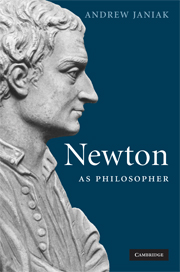Book contents
- Frontmatter
- Contents
- Preface
- Note on texts and translations
- 1 Newton as philosopher, the very idea
- 2 Physics and metaphysics: three interpretations
- 3 Do forces exist? contesting the mechanical philosophy, I
- 4 Matter and mechanism: contesting the mechanical philosophy, II
- 5 Space in physics and metaphysics: contra Descartes
- 6 God and natural philosophy
- Bibliography
- Index
2 - Physics and metaphysics: three interpretations
Published online by Cambridge University Press: 22 September 2009
- Frontmatter
- Contents
- Preface
- Note on texts and translations
- 1 Newton as philosopher, the very idea
- 2 Physics and metaphysics: three interpretations
- 3 Do forces exist? contesting the mechanical philosophy, I
- 4 Matter and mechanism: contesting the mechanical philosophy, II
- 5 Space in physics and metaphysics: contra Descartes
- 6 God and natural philosophy
- Bibliography
- Index
Summary
What is taught in metaphysics, if it is derived from divine revelation, is religion; if it is derived from phenomena through the five external senses, it pertains to physics; if it is derived from knowledge of the internal actions of our mind through the sense of reflection, it is only philosophy about the human mind, and its ideas as internal phenomena likewise pertain to physics. To dispute about the objects of ideas except insofar as they are phenomena is dreaming. In all philosophy we must begin from phenomena and admit no principles of things, no causes, no explanations, except those which are established through phenomena [In omni Philosophia incipere debemus a Phaenomenis, & nulla admittere rerum principia nullas causas nullas explicationes nisi quae per phaenomena stabiliuntur]. And although the whole of philosophy is not immediately evident, still it is better to add something to our knowledge day by day than to fill up men's minds in advance with the preconceptions of hypotheses.
Draft of preface to second edition (Principia, 54)Numerous interpretations of Newton's work, and of his most general philosophical views, have appeared over the past two centuries. Indeed, by the middle of the eighteenth century, only two decades after Newton's death in 1727, there had already been a huge rash of English and French commentaries published in England and on the Continent.
- Type
- Chapter
- Information
- Newton as Philosopher , pp. 11 - 49Publisher: Cambridge University PressPrint publication year: 2008



